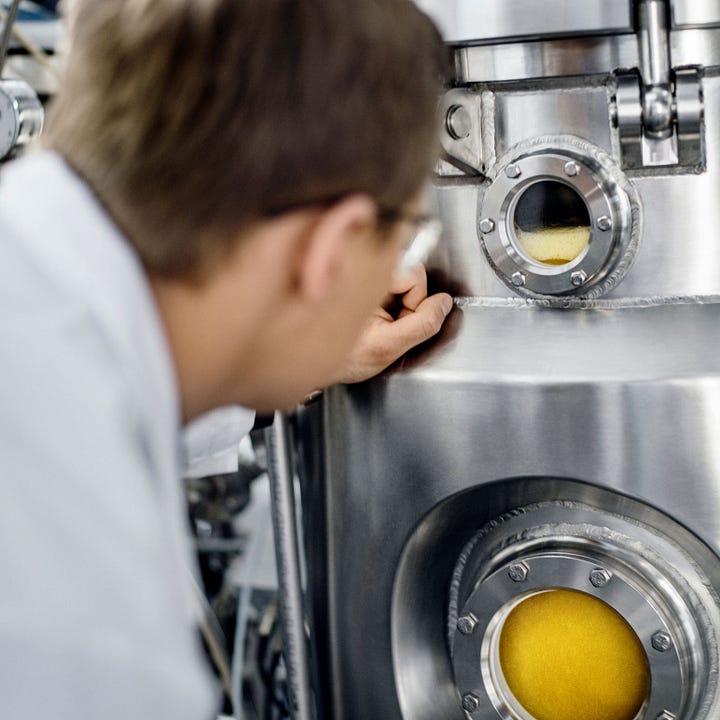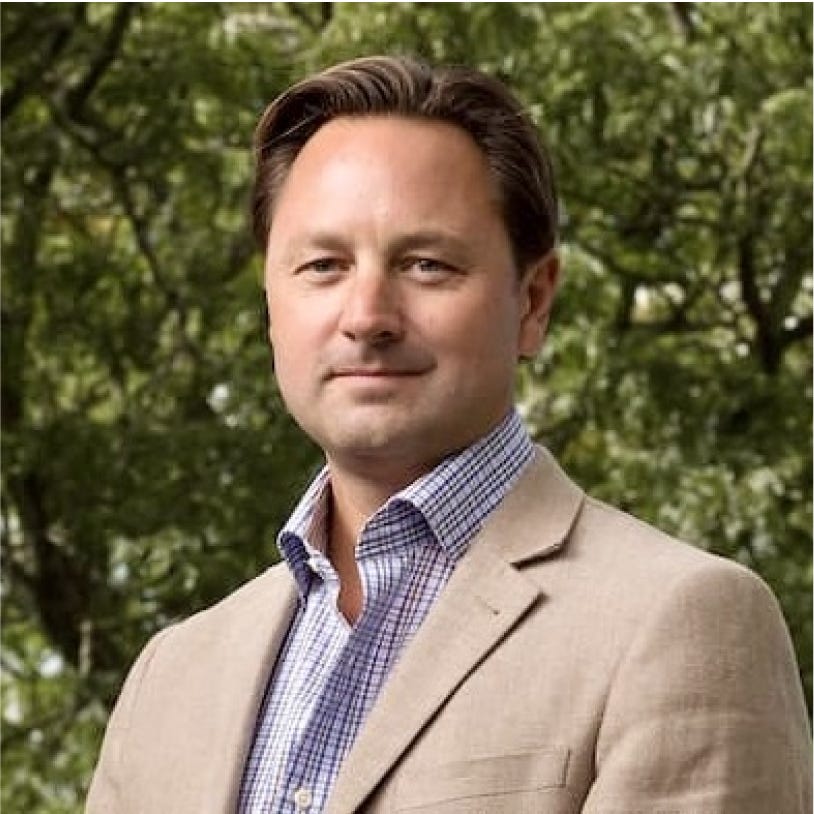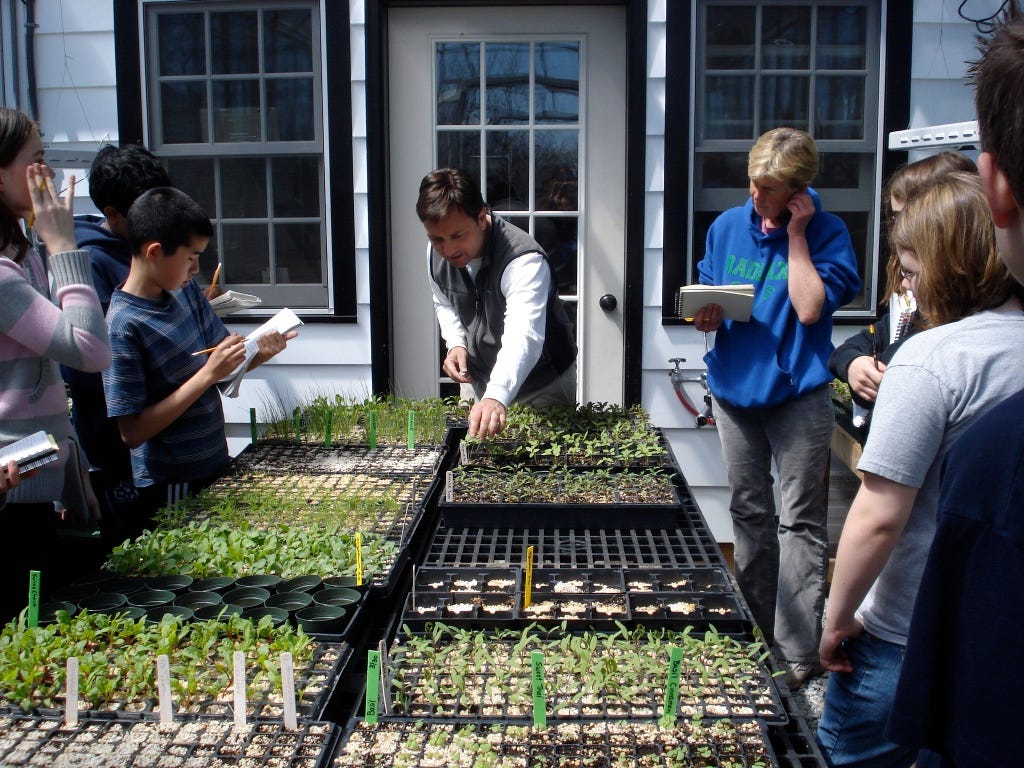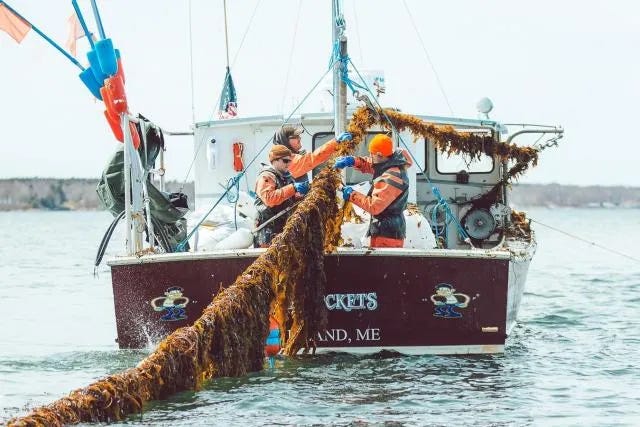The Weekly Anthropocene Interviews: Jason Ingle, CEO of Third Nature Investments
An Exclusive The Weekly Anthropocene Interview
Jason Ingle is a venture capitalist and earth systems investor, founder and CEO of Third Nature Investments. He is focused on transforming human civilization’s food system to be more sustainable.
A lightly edited transcript of this exclusive interview follows. This writer’s questions and remarks are in bold, Mr. Ingle’s responses are in regular type. Bold italics are clarifications and extra information added after the interview.
Thanks for joining this interview! Can you share your personal story and how you became an earth systems-focused investor?
I’m very fortunate to be working in the space I’m working it. It very much connects to my upbringing, on an organic farm in Finger Lakes, New York State. I grew up very close to food production, organic practices, taking pride where your food comes from. Probably 80% of everything we ate was from the farm. My idea of rebellion was to go off and major in finance. So I got a degree in finance, then went to work in the investment world, on the equity side and then the credit side. While I was working in New York for a distressed debt investment fund, it became clear to me how many food and ag companies were struggling. Laden with debt, low margins, capital-intensive. Companies like Smithfield Foods, A&P Groceries were near or in bankruptcy. A combination between that and getting married and starting a family were catalysts for me to think about how I could make an impact on the food system.
Greener Partners
So around 2007, I cofounded a nonprofit called Greener Partners in Greater Philadelphia. Land conservation, but using conserved land to create farms based on sustainable practices for the betterment of the surrounding communities. From there, we started looking at the importance of educating young people about healthy food. We wanted to bring joyfulness to healthy food and local farms. So that was a big part of the development of Greener Partners, adding some of that educational standpoint as well. And from there, we worked in Chester City, which is a very food-insecure district. I think it’s the second largest food-insecure district in America. We worked with a number of schools, and it became apparent that we could provide education about healthy food, but when the students are going home, they don’t have access to healthy food, they don’t have a local grocery store with healthy food. We started a few CSA farms with farm shares for community members, families, and young kids.
Five years into Greener Partners, it became clear that scaling a 501(c)(3) nonprofit is very difficult to do. We were having a great impact within the region, but we had trouble scaling beyond that. So we looked around for something in the sustainable ag space that could be a bit more scalable. It was around the same time that the slow money movement was beginning. It was after 2008, with the financial issues. For me, slow money was the beginning days of impact investing, a term coined around 2007, 2008. I was following the space, and it seemed like an obvious way to be involved in how you invested your money. At that point, in 2010, we started to explore the idea of started a venture fund. I had been doing some angel investing in startup companies. It takes a lot of effort to work with startup companies, and I started to think about how we could formalize an actual fund where we could actually have a bit more rigor behind our thesis1, and creating that.
Closed Loop Capital
In 2010-11, we formed a thesis around what ultimately became Closed Loop Capital, the first impact-oriented food system innovation fund out there. There were a lot of individuals investing in startups, but not many venture funds. Our thesis was, the industrialized food system had done plenty of damage and caused a lot of issues for planetary and human health, and we have finite resources as well. We felt that there was a thesis to build around capitalizing talented entrepreneurs and innovative technologies throughout the supply chain from the field all the way through to the fork. We got going in 2012 in earnest and began investing. The goal was to go on a learning journey. As we invested in companies, we were able to gain insights throughout the supply chain and the value chain, really to look at and become more aware of the challenges, barriers, and problems within the industrialized food system.

We were incredibly fortunate to invest in Beyond Meat, beginning in early 2013. Exactly ten years ago last month, we invested in the company in its earliest stages. It was exciting, we had spent some time thinking about their ingredients profile, price parity, many of the things that are still a challenge in alternative proteins. Even back then, we were thinking about that. But ultimately felt that if we were going to work for a more sustainable and less exploitive and extractive protein, with plant-based protein as a big part of that equation.
So that really set us on our journey for most of the 2010 decade through Closed Loop Capital, investing in companies through the supply chain. We invested in Mercaris, an exchange trading and data services company that helps farms connect with food producers, organic-certified commodity crops. If you want companies like Beyond Meat to scale, they’re going to have to have sources of those ingredients.
And then further upstream, we invested in Conservis, a software company that provides data insight to small and medium sized farms at the unit economic level that allows them to understand their profitability as they plant, their crop rotation, their crop selection. Because at the end of the day, farmer welfare was a big challenge and still is a big challenge: we can talk about healthy food, but if farmers can’t grow a viable business, it’s hard to accomplish that.
We invested in companies aimed at disrupting synthetic fertilizers, pesticides, insecticides. So, looking at the biological space, we invested in a company called Inocucor, which became Concentric, based in Canada, doing some amazing work there.
More recently, in the late 2010s, looking at the nexus between food and health, and the beginning of the “food is medicine” movement, I was fortunate to really see the opportunity there through Greener Partners, on the nonprofit and philanthropic side, and in starting to see some venture-worthy companies in that space. So that really led us to that point.
It took until about 2017 when Beyond Meat started to get traction, and in 2019, they did their initial public offering. That was incredibly exciting, the validating moment that we had been waiting for, that we had set up to try to achieve. We wanted to validate the ability to invest in the future of food in a way that also could provide the same profitability and return profile that traditional venture investing, and we ultimately achieve that in in May of 2019, and we ultimately achieved that in May of 2019 with Beyond Meat’s IPO. There was already a lot of capital starting to flow into the space, but that certainly just accelerated that even more. I think in 2021 there was $3 to $6 billion that came into the space of alternative proteins, which was the entire amount up until that point cumulatively. So a ton of new investor interest in the space. But at the end of the day, as you’re well aware, it’s become a polarizing conversation around alt-protein as a disruptive force to traditional protein sources.
In some ways, as we went into COVID, reflecting on our last decade, we thought: our investment in Beyond Meat was a big win for the space and for us, but did we really achive what we set out to do? Did we actually transform the food system? No, not really. That point was when we started to piece together a next chapter on what we’re going to be investing in, from just being a food systems investor to realizing that food systems interact with all systems, from water to climate to oceans to lands to health. To be an effective impact investor, we could no longer focus on one theme.
Third Nature Investments
With that, we formed a new thesis for a new investment platform, which ultimately became Third Nature, what we’re calling an “earth systems investment” strategy. Food systems will be potentially half; there is no human activity more impactful on planetary health that our agricultural production to feed eight billion humans. But certainly, one thing being that there’s been a lot of capital flowing into the space, and we try to find spaces where we can be catalytic. Ultimately, we found a number of those that we’re excited about.
So I’d love to hear about those companies, whatever you feel comfortable sharing. And I’d also love to hear your thoughts on up-and-coming food technologies, like microbial farming and Solein, the ultra-sustainable microbial protein from a Finnish startup.
We’re taking a multi-pronged approach to investing. That can be everything from stage of investing to crossing over across different themes to utilizing philanthropic dollars, catalytic capital, regulatory change, consumer awareness. We’re looking to build spaces that are nascent. A couple areas, we’re really starting to get excited about.
Ocean-based food production is a big area. We’ve put a lot of pressure on terrestrial-based food production. At the end of the day, the ocean is 71% of our planet, we are the blue marble, and sadly we’ve done many of the same things to our marine environment as we have to the terrestrial. Overfishing, polluting. One of our goals with Third Nature is to support and capitalize emerging companies and entrepreneurs that are using the ocean in a partnership manner, not looking to bend the ocean to humans’ will. How can we invest in viable businesses using materials from the ocean? Food applications using macroalgae, kelp, seaweed. Alternatives to textiles, alternatives to plastic. We want to displace some of the most harmful materials we use in industries and manufacturing.
That is one of the areas that is a high focus for us, finding and investing in companies that have the ability to partner with the ocean and provide benefits to the ocean. There’s also the social benefit aspect of building revenue opportunities for livelihoods for coastal economies.
You did a profile on Atlantic Sea Farms: one of the greatest parts of their story is how they partnered with lobster fisherman along the coast of Maine to provide a mitigation strategy for the disruption that will occur as the Gulf of Maine continues to work. Fishermen using kelp as a beneficial cover crop for the ocean, it’s very much an ocean acidification mitigator in localized areas, a habitat builder, it’s highly regenerative. That’s been one of the big areas that we’ve been excited about.
Also, as you alluded to, biomaterials: mycelium-based, myco, mushroom, huge opportunities there. Something like a hundred different startup companies are in that space, many of them focused on alternatives to animal hides and leathers, and now moving into many other applications. Our first foray into that space was Myco Technology, and the powerful application of using mycelium-based technology for fermentation, focused on a number of negative traits that the mycelium could solve for a food, and more recently looking at some of the applications of mycelium for alternative protein formats as well.
I love the Quorn product. That’s already a mycelium alternative protein.
Exactly. Going forward, the common theme on seaweed, macroalgae, mycelium, mushroom, is that these are all highly regenerative materials. Regenerative, restorative, nature-based components that can displace some of the high-input, heavy users of water, heavy pesticides practices.

One of the companies we've invested in through Third Nature as a way to continue to try to find a more whole food based plant-based protein is The Jackfruit Company and their branch Jack & Annie’s. That goes to my point around perennial crop production. Jackfruit is ubiquitous in India, where it literally goes to waste for the most part. Very fibrous, very protein-heavy. And it allows Jack & Annie’s to create a whole food-based, plant-based protein. So that's one of our newer investments that we're very excited about, and they have a number of products already in the market in a lot of stores in the US. That’s a great example of where I think the plant-based protein space needs to go. Consumers are saying that want “real ingredients,” not so much processed food, not so many, you know, binding agents, and so that we feel is the next chapter. They have an amazing founder, Annie Ryu, who visited India and was really inspired by the opportunity to use the jackfruit, to put it into use for protein to support farmer livelihood in India.
I really love jackfruit, but it’s hard to get in the US. And when you do get it, it’s often sold in cans with sugary syrup, that makes it hard to cook in savory dishes. I actually once shared a jackfruit with a critically endangered greater bamboo lemur when I was working in Madagascar in 2019. Jackfruit is technically an “invasive” species there, but the lemurs love it. The lemur ate into a jackfruit when it was on the tree, and then later it fell down and we ate it. The story’s on my blog.
We're a big investor in Beyond Good, which is a chocolate company that's making chocolate in Madagascar from locally grown cacao, which is bringing value back to the country of Madagascar by producing the chocolate, you know, at at the site itself. And we just released a lemur-themed bite-sized chocolate as well here in the US. So it's another fascinating company. Amazing and powerful story around creating chocolate at the source in Madagascar. But I did not know about the jackfruit being in Madagascar!
One of the themes for Third Nature is to identify and capitalize companies that are using more regenerative materials with new businesses models for processes that are building blocks of the 21st century economy. So using much of the good from the 20th century economy that we build, which lifted billions of people out of poverty, but doing it in a way that can drop in and displace many of the worst materials for both planetary and human health. That is in the simplest form what we are focused on doing. Climate tech as a space has become big. There’s no doubt we need to decarbonize our atmosphere. But if we decarbonize our atmosphere and go back to business as usual, we haven’t solved what we need to. We’re still depleting our resources, we’re still being highly exploitative to rural and indigenous communities that have relationships with those areas that we’re extracting from. We have a lot of work to do, and it goes far beyond decarbonization. What we call “detoxifying all natural systems” is the real goal.
That’s a fascinating contextualization. I wanted to ask: I’m personally a vegetarian, what are your thoughts on animal welfare’s role in what you just talked about? Because one of the problems with the current industrialized food system is that it condemns billions of creatures at least as intelligent as a dog or a cat to short lives full of torture and death. There are some interesting efforts to incrementally improve on animal-based agriculture, like feeding seaweed to cattle to reduce their methane emissions. But what I want to ask is, do you have a specific policy of only investing in plant-based stuff?
It’s a big conservation. As somebody who grew up on an organic farm and has been a vegetarian since I was eleven years old, I do think we are going to have to be more plant-based. For ocean-based, we’re not investing in fisheries or farmed fish in sea pens or anything like that. None of that. It’s not an area we’re interested in. We’re very focused on macroalgae. We see that as an area with a lot of work that has to be done. For example, finding additional breeds of seaweed species that can be grown natively in various coastal habitats in a way that is symbiotic with the local waters. That alone, along with the processing technology and the scale that’s needed, is going to take a lot of time. The fact that Atlantic Sea Farms is more than 80% of domestic kelp production last year tells you how much work we still have to do to prop up that whole space. We are large supporters and investors in Atlantic Sea Farms, a food-based application, but we also invested in Keel Labs, creating a seaweed-based textile for the fashion industry. They’re trying to displace materials like polyester that are very damaging and produce a lot of microfibers. Same issue as microplastics, something that we’re just starting to be collectively aware of. You’re finding microplastics everywhere from the summits of the highest peaks of the world to the trenches of the lowest depths of the ocean. And as petroleum producers move away from traditional petroleum, they’ll be ramping up plastics production. So we have a lot of work to do to find really cost-effective, regenerative, low-input, high-impact companies that can displace some existing incumbent manufacturing facilities.
The other thing I’d say is, I’m very excited in some ways about regenerative agriculture, but I’m also very nervous around it.
It can be very easily greenwashed. You can very much imagine that “regenerative” just becomes the new “natural,” a word that means nothing slapped onto the same industrial food products.
It’s already happening. It’s a concern. I’m also anxious about the argument right now between the alt-protein space and the regenerative ag space. The infighting between those groups doesn’t really help. The priority should be on how we can disrupt the existing, incredibly damaging industrialized food system. That again gets back to taking a more systems based approach to investing. You can’t throw up barriers like “we invest only in North America.” What if you’re incentivizing Brazil to continue to deforest Amazon rainforest to grow soy for animal protein expansion? That is at the end of the day why you have to take a systems approach. Otherwise, the negative externalities are just getting tossed into your neighbor’s yard? That’s one of the blind spots right now for impact investors. Everyone’s focused on impact investors and measurements. But if you’re only measuring your own portfolio and your own enterprise-level impacts, you’re missing much of the picture.
Regenerative ag is already falling into the same traps where the incumbents say, we want a piece of that action, “sustainability” is a word that’s resonating with consumers, so we’ll use that term as well. You’re seeing that with the terms “ESG” and “impact investing” as well. Very politicized, very polarized. That’s why we’re intentionally using the terms “earth systems investors.” Language is essential, definitions are essential: when we don’t really define these clearly, it can be taken and used for greenwashing. That’s the worry I have for the whole space. That’s why we're trying to to establish new language, so we can really have the rigor underneath it from day one around what our intentions are.


Absolutely. Also, what are your thoughts on microbial farming? Like Solein, from that Finnish company Solar Foods, growing protein from microbes with orders of magnitude lower land and water inputs that traditional animal farming. That kind of technology could be huge.
I’m very aware of it. We’ve been monitoring it very closely. In the 21st century, we’re going to lean more on biology, and relinquish some of our chemistry mindset. Shifting to a biology-based economy versus chemistry-based economy, partnering with nature in ways that are less extractive and damaging. Yes, we’ve been incredibly innovative humans in the 20th century to use chemistry, but it has been in a way that has been somewhat damaging, polluting, wasteful, and extractive. I’m very excited about the microbiology and biology generally approaches. I would say these are spaces that take a long time to commercialize. Investors, especially with the amount of capital that has come into venture funding in the last five years, underestimate the time and cost and expense that will go into really getting to commercial products, across so many different applications. We’re pretty excited about this space, we see it as core to a 21st-century economy, we also know that it’s going to take time. Many of the things we invest in take a decade. Even Beyond Meat, start to finish, it took almost a decade for them to get a significant revenue ramp from a product that was strongly appealing to consumers. These are areas that take significant human and financial resources, and time, to get to real viability.
I think it's going to be a big part of the future. We're excited to be there for it. We're monitoring it closely. We love talking to entrepreneurs in the space. We’re monitoring it closely, we love talking to entrepreneurs in the space. But again, knowing that there's gonna be some some time that's involved to get there.
What else would you like to share? What question should I have asked that I didn’t ask?
Looking as a food investor, one of the things I try to build into the storylines is, “How do we frame it?” Is it just talking about alt-protein or regenerative ag? The beauty of Beyond Meat and Impossible was that you were taking a very commoditized product, meat, and creating a brand affiliation around it. I think there’s a lot of areas not getting enough press around creating a regenerative economy. Such as, how do we use more perennial crops? How do we incorporate invasive species? How do we incorporate things like seasonality, human health, different farming techniques? There’s a lot of things that get lost because they’re not high tech, so to speak: partnering with nature, using natural rhythms of seasonality, perennial crop production, they are not getting enough press because we’re so quick to jump into whatever’s hot. I hope to see some light shined on some of those spaces for sure. While it might not be a huge moneymaking opportunity, it’s a big part of creating a food system that’s going to function in less damaging ways.
An investment thesis is a formal argument for an investment strategy.









Five stars interview! I've said it once and again now, you really should combine the interviews under one cover, I'd buy a copy in an instant. Having bought the Beyond products since they first started appearing on the shelves I can attest to how good they are! It's great to read this interview with a man who substantially enabled that product being widely available. He's right about the lengthy nature of the effort..the entrenched, animal meat, chemical supported, industry will not "go gentle into that good night."